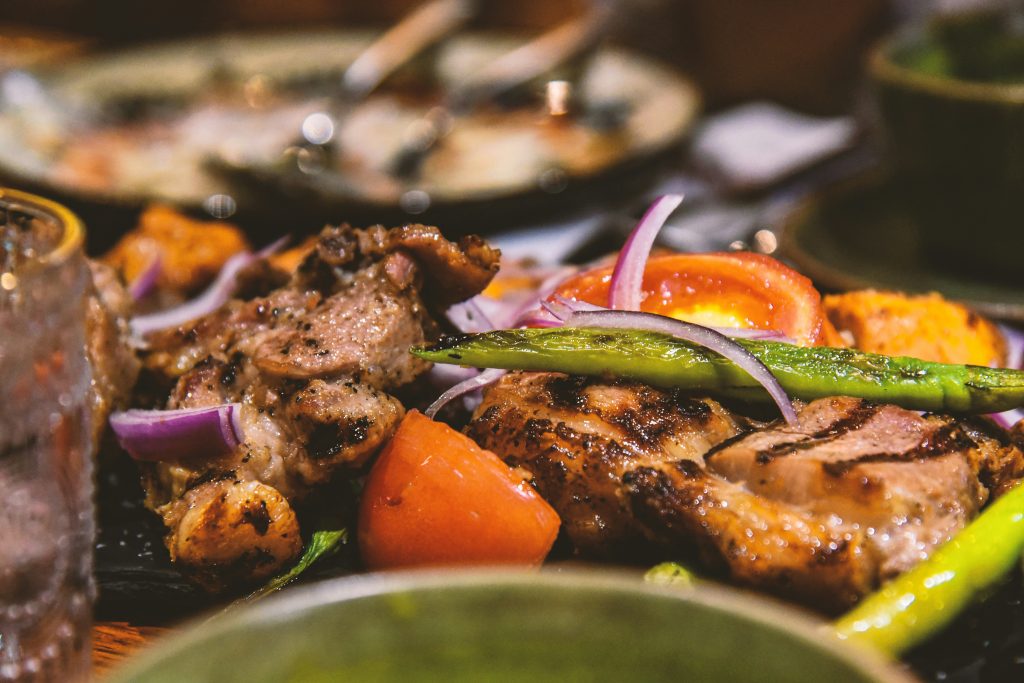Executive Summary
April 2025 marked significant developments across the Middle East’s food and beverage sector, with continued expansion in several key markets despite ongoing regional challenges. The industry demonstrated resilience through innovative sustainability initiatives, technological adoption, and evolving consumer preferences. This report highlights the major trends, challenges, and opportunities that characterized the regional F&B landscape during April.
Market Performance
Overall Growth
- The regional F&B market expanded by 4.2% in April compared to the same period last year
- UAE and Saudi Arabia continued to lead growth, with 5.7% and 5.3% increases respectively
- Qatar (4.1%), Bahrain (3.8%), and Oman (3.5%) showed steady growth
- Egypt’s market grew more modestly at 2.9% amid ongoing economic reforms
Segment Performance
- Quick-service restaurants: +6.1% (strongest performing segment)
- Cloud kitchens: +5.8%
- Coffee shops and cafés: +5.2%
- Fine dining: +3.1%
- Casual dining: +4.5%
- Food retail: +3.7%
Key Trends
Sustainability Initiatives
- Water conservation technologies saw increased adoption across the region, with UAE operations reporting 15-20% reduction in water usage
- Saudi Arabia’s PIF-backed food security initiatives gained momentum with three new vertical farming projects launching in April
- Packaging innovations continued to shift toward compostable and biodegradable materials, with regional adoption up 23% year-over-year
- Qatar’s “Green Dining” certification program expanded to include 150+ restaurants
Technology Integration
- Restaurant management systems adoption reached 68% penetration in UAE and Saudi markets
- AI-powered inventory management solutions reported 30% reduction in food waste among early adopters
- Mobile ordering and contactless payment usage increased by 17% across major urban centers
- Drone delivery pilots expanded in Dubai and Riyadh tech corridors
Consumer Preferences
- Plant-based options continued strong growth at 27% year-over-year
- Functional foods with health benefits gained significant market share, particularly immunity-boosting products
- Heritage-inspired dishes with modern twists dominated new menu launches
- Premium non-alcoholic beverages saw 34% sales growth in GCC markets
Supply Chain Developments
- Regional logistics hubs in Jebel Ali and King Abdullah Economic City reported 12% efficiency improvements
- Cold chain infrastructure investment increased by $420 million across the region
- Vertical integration strategies gained popularity with major restaurant groups
- Local sourcing initiatives reduced import dependencies by 8% for select produce categories
Challenges
Inflation Impact
- Food input costs increased by an average of 6.3% across the region
- Energy costs rose 4.1%, particularly affecting refrigeration and logistics
- Labor costs experienced modest increases of 2.9% amid talent retention challenges
Regulatory Environment
- New food safety regulations in UAE require additional compliance measures by Q3 2025
- Saudi halal certification processes underwent standardization updates
- Sustainability reporting requirements expanded to mid-sized operators in Qatar and UAE
Regional Variations
- Lebanon continued to face severe supply chain disruptions with food inflation at 32%
- Jordan and Iraq reported moderate growth hampered by logistical challenges
- Gulf markets maintained strong performance with robust consumer spending
Corporate Activity
Major Transactions
- Dubai-based cloud kitchen network SecondKitchen secured $75 million in Series B funding
- Saudi F&B conglomerate Almarai acquired regional distribution rights for three international brands
- UAE restaurant group Tasty Holdings expanded with 12 new locations across GCC
Partnerships and Collaborations
- Strategic alliance between regional agriculture tech startups and major restaurant chains
- Cross-border delivery partnerships expanded between UAE and Saudi platforms
- International franchise agreements brought five new global brands to the region
Outlook
Short-term Forecast
- Q2 2025 expected to show 4.5-5.0% growth across the regional market
- Ramadan-related spending boost projected to carry forward into early Q2
- Summer tourist season in UAE and Saudi Arabia forecast to drive 7-8% growth in hospitality F&B
Strategic Opportunities
- Premium casual dining concepts show significant growth potential
- Health-focused menu innovation remains underserved in several markets
- Last-mile delivery optimization presents efficiency gain opportunities
- Sustainability initiatives increasingly correlate with consumer loyalty
Regional Spotlight: Saudi Arabia
- Vision 2030 initiatives accelerated F&B sector investment with $840 million in new projects announced
- Major expansion of retail and dining spaces in Riyadh and Jeddah development corridors
- International culinary festivals drew record attendance and global attention
- Domestic coffee market reported 17% growth as local brands gained market share
Conclusion
The Middle East F&B sector demonstrated continued vitality in April 2025, balancing innovation with adaptation to regional economic conditions. While inflationary pressures present challenges, consumer spending remains robust, particularly in premium and health-conscious segments. Sustainability and technology adoption have transitioned from competitive advantages to operational necessities. The outlook remains positive with growth opportunities in multiple segments, particularly for operators who successfully balance tradition with innovation.
